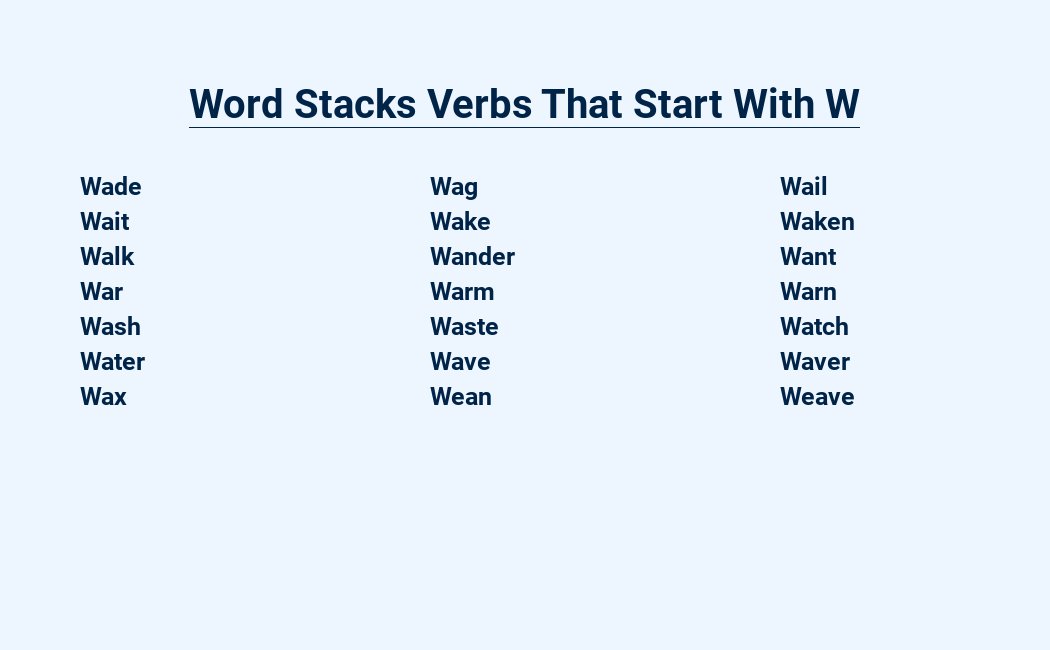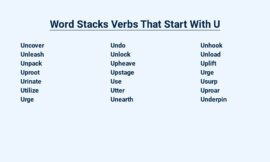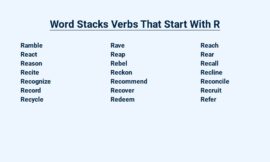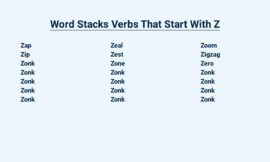Embark on a linguistic journey as we delve into the captivating world of “W” verbs.
From wagering on thrilling outcomes to wandering through enchanting forests, these verbs paint a vivid tapestry of actions and emotions.
Discover the nuances of waiving rights, unleashing powerful wallops, and yearning for heartfelt wants.
Explore the protective embrace of warding off danger, the urgent call to warn, and the refreshing act of washing away worries.
Witness the consequences of wasting resources and the focused attention of watching life’s moments unfold.
Let’s unlock the power of “W” verbs together!
| Verb | Definition | Example |
| Wait | To stay in a place or position until something happens | She waited for the bus to arrive. |
| Walk | To move on foot at a moderate pace | He walked to the store to buy groceries. |
| Want | To desire or wish for something | She wants a new car. |
| Warn | To give notice or advice of danger or trouble | He warned her about the slippery road. |
| Wash | To clean something with water or other liquid | She washed the dishes after dinner. |
| Waste | To use or spend thoughtlessly or extravagantly | He wasted his money on lottery tickets. |
| Watch | To look at something intently or attentively | He watched the game on TV. |
| Water | To give water to a plant or animal | She watered the flowers in the garden. |
| Wear | To have or carry something on one’s body | He wears a suit to work. |
| Weave | To make cloth or other fabric by interlacing yarns or threads | She weaves beautiful scarves on her loom. |
Wade: To walk or move through water or other liquid.
Wag: To move something back and forth quickly, especially the tail.
Wail: To cry loudly and sorrowfully.
Wait: To stay in a place or position until someone or something arrives or happens.
Wake: To stop sleeping and become conscious.
Walk: To move on foot at a regular pace.
Wall: To enclose or surround something with a wall.
Waltz: To dance in a slow, graceful manner.
Wander: To move about aimlessly or without a definite purpose.
Want: To desire or wish for something.
War: To engage in armed conflict between two or more groups of people.
Warn: To give notice of danger or something undesirable.
Warp: To bend or twist something out of shape.
Wash: To clean something with water or a liquid.
Waste: To spend or use something extravagantly or carelessly.
Watch: To look at something or someone with close attention.
Water: To supply something with water.
Wave: To move something back and forth in the air or water.
Weaken: To make or become weaker.
Wear: To have something on one’s body as clothing or an ornament.
Word Stacks Verbs Starting with “W”
Wager
Wager: To stake money or something of value on the outcome of an uncertain event, typically involving betting or gambling. It often involves risk and a chance of winning or losing.
Wagers can be placed on various events, from sports matches to political outcomes.
Definition: To bet or stake money or something of value on the outcome of an event.
Wager: A commitment of money or something valuable on an uncertain outcome, usually in the context of a game or competition.
Usage: “He wagered all his money on the horse race.”
Usage: “He wagered all his money on the horse race.” In this example, “wagered” means to bet or stake money on an uncertain outcome, typically in a game or contest. Here, the speaker is betting all their money on the outcome of a horse race.
Waive
Waive: to voluntarily give up a right or claim. Examples:
- The tenant waived his right to a security deposit.
- The company waived the late fee for the overdue bill.
Definition: To give up or renounce a right, claim, or privilege.
- Definition: To voluntarily relinquish a right, claim, or privilege.
- Background Context: This verb is often used in legal or formal contexts to describe the act of formally surrendering a right or entitlement.
Usage: “She waived her right to the inheritance.”
In the inheritance context, “waived” means to voluntarily give up a legal right or claim, often through a written document.
It implies a conscious and deliberate choice to relinquish one’s entitlement to the inheritance.
Wallop
Wallop, a forceful blow or hit, often accompanied by a loud sound, is frequently used in informal contexts to emphasize the impact or intensity of an action.
Definition: To strike or hit with great force.
Wallop: Definition: To strike or hit with great force.
This verb is often used in sports, particularly boxing and wrestling, to describe a powerful and impactful blow.
It can also be used more generally to describe any forceful strike or collision.
Usage: “He walloped the punching bag with all his might.”
“Wallop” is a verb that means to strike or hit something with great force.
In the sentence “He walloped the punching bag with all his might,” the word “walloped” describes the man’s powerful and forceful strike on the punching bag.
Wander
Embark on a captivating journey as you wander through uncharted territories, letting your feet guide you to hidden gems and unexpected encounters. Allow your curiosity to lead you down paths less traveled, discovering the wonders that lie beyond the familiar.
Definition: To move or go about aimlessly or without a definite purpose.
Wander: To move or go about aimlessly or without a definite purpose. Associated with traveling without a fixed route or direction, often taken for pleasure or exploration.
Can also be used figuratively to describe a state of mind or a train of thought.
Usage: “He wandered through the forest for hours.”
Amidst the towering trees and rustling leaves, he embarked on a solitary journey, his footsteps leaving ephemeral traces on the forest floor.
Hours unfurled as he wove through the verdant labyrinth, his mind adrift in contemplation.
Want
Want: Desire strongly or eagerly. Synonyms: covet, crave, yearn, long for, hunger for, thirst for, hanker after, pine for, itch for.
Definition: To desire or wish for something.
Yearn: To crave or long for something intensely and persistently.
This profound emotion often drives individuals to pursue their aspirations with fervor and determination.
Usage: “She wanted a new car.”
In the sentence “She wanted a new car,” “wanted” is used to express a desire or wish for something.
It is in the past tense, indicating that the desire existed at a specific time in the past.
“Wanted” is a common verb used to describe a longing or craving for something.
Ward
Ward off danger or harm.
Protect or guard someone or something.
Confine or restrict someone to a particular place.
Stay off or prevent an attack.
Definition: To keep off or prevent something from happening.
Avert: To keep off or prevent something from happening. This verb is often used in the context of danger or harm, as in “avert a crisis” or “avert a disaster.” It can also be used more generally to mean “to prevent something from occurring,” as in “avert a delay” or “avert a problem.”
Usage: “The police warded off the attack.”
In the sentence “The police warded off the attack,” “warded off” is used to describe the action taken by the police to prevent or repel the assault. It implies a successful defense against an imminent threat.
Warn
- Warn: Alert someone to a danger or potential problem.
- Issue a warning to someone about something.
- Give a cautionary notice.
Definition: To give notice of danger or something undesirable.
Warn: To alert or notify someone of potential danger, harm, or something undesirable.
It involves communicating information about a threat, risk, or impending issue to prepare or take necessary action.
Usage: “He warned her about the dangerous dog.”
“He warned her about the dangerous dog” illustrates the verb “warn” in action.
It portrays a scenario where an individual cautions another person about a potential threat, emphasizing the importance of being vigilant and taking necessary precautions.
Wash
- Wash: Cleanse with water or a cleaning agent.
- Associated words: laundry, dishes, shower, hygiene.
- Can refer to washing hands, clothes, vehicles, or surfaces.
- Often done to maintain cleanliness and remove dirt or stains.
Definition: To clean something with water or a liquid.
Wash: Definition: To clean something with water or a liquid.
Commonly used to remove dirt, stains, or other unwanted substances from objects, surfaces, or living beings. The process of washing involves applying water or a liquid, along with cleaning agents if necessary, and physically removing impurities through rinsing, scrubbing, or other methods.
Usage: “She washed the dishes.”
“She washed the dishes” exemplifies the verb “wash” in action. It depicts a scenario where a person performs the act of cleaning dishes, typically using water and detergent, to remove dirt and residue.
This usage showcases the verb’s practical application in everyday household tasks.
Waste
Waste is the act of using or expending something carelessly, extravagantly, or to no purpose. It can refer to the discarding of unwanted or unusable materials, the consumption of resources without regard for their future availability, or the destruction of natural resources.
Definition: To spend or use something extravagantly or carelessly.
Waste: To spend or use something extravagantly or carelessly. It implies a lack of prudence or responsibility in resource management, resulting in the depletion or depletion of resources.
Usage: “He wasted his money on gambling.”
With the action of gambling, the individual engaged in monetary loss due to wagering. This behavior resulted in the depletion of financial resources due to unsuccessful outcomes.
Watch
Watch: Keep a close eye on someone or something, typically in order to prevent harm or ensure safety. Also refers to the act of observing or paying attention to something.
Definition: To look at something or someone with close attention.
“Watch” means to observe or examine something or someone attentively. It involves paying close attention to details and keeping an eye on a particular person, object, or event.
The act of watching can be done physically, through direct observation, or symbolically, through the use of technology or other means of monitoring.
Usage: “He watched the game on TV.”
“Watched” implies focused attention and prolonged observation.
It suggests a deliberate act of engaging with the visual content on a television screen, often for entertainment or information purposes.
Final Verdict
The realm of words commencing with “W” unveils a treasure trove of captivating verbs, each possessing its own distinctive essence and application. From the thrill of wagering and the renunciation of rights through waiving to the forceful impact of walloping and the aimless exploration of wandering, these verbs paint a vibrant tapestry of human experiences and actions.
They eloquently express our desires (wanting), protective instincts (warding), and sense of caution (warning), while also encompassing the mundane tasks of washing and the unwise squandering of resources (wasting).
With their range of meanings and nuances, these verbs starting with “W” enrich our vocabulary and empower us to communicate with precision and eloquence.




